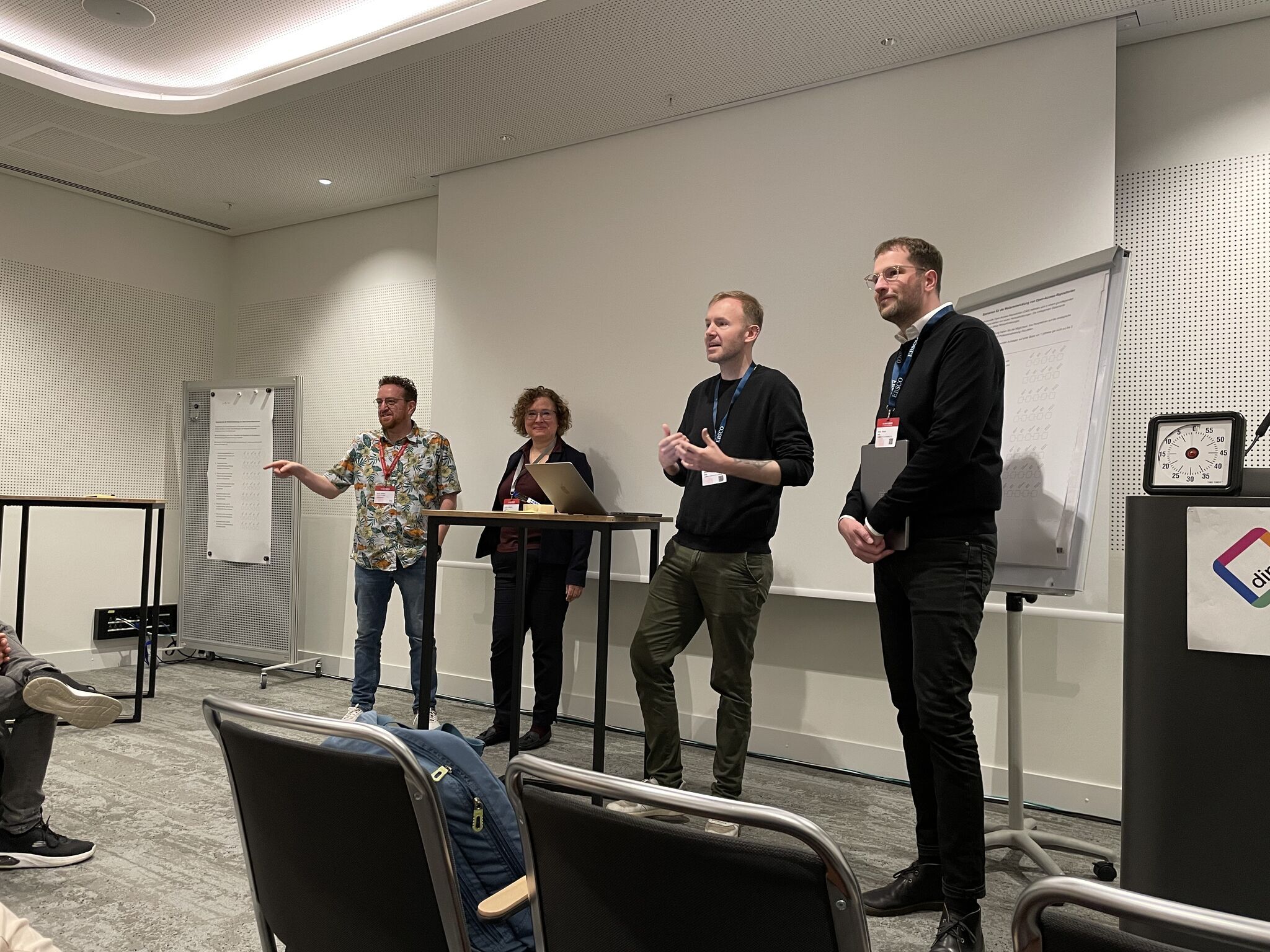In the beginning of June 2024, Nature reported on the Japanese Ministry of Education’s plan to invest 10 billion yen in expanding institutional Open Access Repositories (Singh Chawla 2024). This initiative provides a good opportunity to discuss the future of Open Access Repositories at the https://2024.bibliocon.de/.
In collaboration with the project “Professionalization of the Open Access Repositories Infrastructure in Germany” (Pro OAR DE) (Pampel and Rothfritz 2023), funded by the Federal Ministry of Education and Research (BMBF), the Electronic Publishing Working Group (AG E-Pub) of the German Initiative for Networked Information (DINI) organized a Hands-On Lab titled “Scenarios for the Development of Open Access Repositories” on June 6, 2024, during the 112th BiblioCon. The goal was to develop scenarios for the future orientation of institutional Open Access repositories with participants from academia, libraries, and other information infrastructures.
The methodological approach for this event was based on the Delphi concept (Häder 2014), (Niederberger and Renn 2019). Participants were asked to evaluate predefined statements on repositories in two consecutive rounds. This method aimed to reach a consensus on specific scenarios for the future of repositories. About 30 people participated in the lab and were divided into groups of four which simultaneously discussed the scenarios. The discussions were based on eight statements that were prepared by the organizers in advance and addressed aspects of the development of Open Access repositories.
First, each group assessed the eight statements with the aim of coming to a consensus about the topic. For example, participants were asked to discuss the following proposition: “Preprints play an important role in the informational expansion of repositories.” Each group needed to develop a joint position on this and the other seven statements, by rating them on a scale from “strongly disagree” to “strongly agree.”
In the following round, each group further explored three statements and discussed strategies and concrete measures to address the issues raised in each statements. The goal was to develop practical approaches to the topics, based on a shared understanding of the statements, focusing on the joint discussion of solution strategies.

Lessons Learned
The chosen method did not allow for in-depth examination and was not representative, but it enabled a focused and useful discussion of current issues facing institutional repositories. Reaching a consensus was challenging, as interpretations of the statements varied significantly among participants, and evaluations differed depending on perspectives and group compositions.
For the following three statements, approval ratings were identified in all four groups (grouped as “somewhat agree” and “strongly agree”):
Repositories’ user interfaces should become more intuitive and modern.
Text and data repositories should intensify their exchange with each other.
Repositories should take more measures to increase the visibility of their content.
In the second round, the following implementation strategies were discussed for these three statements:
Repositories’ user interfaces should become more intuitive and modern:
Offer multilingual user interfaces that support languages beyond German and English.
Simplify uploads through data import via API integration (e.g., DOI queries via Crossref).
Eliminate mandatory fields that researchers must fill out.
Ensure responsiveness on various devices.
Text and data repositories should intensify their exchange with each other:
Ensure automatic data flows between research data repositories and institutional Open Access repositories.
Simplify uploads through data import via API integration (e.g., DOI queries via Crossref).
Evaluate local architecture to determine whether a generic repository for all object types or different repositories for each publication type is more practical.
Repositories should take more measures to increase the visibility of their content:
Display bibliographic data in the OPAC or Discovery System.
Index bibliographic data in search services .
Actively implement search engine optimization measures.
Enable automated data flows via persistent identifiers.
The authors thank the participants for their open discussions and for sharing their experiences on strategies to further professionalize Open Access repositories.
The results will also be used for the further development of the DINI Certificate for Open-Access Publication Services and in the ongoing work of the Pro OAR DE project. Workshops on some aspects will be held in the further course of the Pro OAR DE project.
Further information about the research group can be found on our official website.
This text – excluding quotes and otherwise labeled parts – is licensed under the CC BY 4.0 DEED.
Photo Credit: Melanie Seltmann, licensed under the CC BY 4.0 DEED.
References
Citation
@online{beucke2024,
author = {Beucke, Daniel and Meinecke, Isabella and Pampel, Heinz and
Wrzesinski, Marcel},
title = {Report on the {Hands-On} {Lab} “{Scenarios} for the
{Development} of {Open} {Access} {Repositories}” at the 112th
{BiblioCon}},
date = {2024-07-15},
url = {https://doi.org/10.59350/mg09a-5ma64},
langid = {en}
}